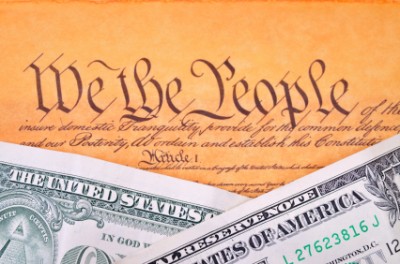Editor’s Note: Way Off the Grid is a satire feature of Off the Grid News. While the articles in this section may deal with current events, they are meant to portray these topics in a satirical and humorous light.
WASHINGTON, D.C. – The Supreme Court’s 7-2 decision Monday to strike down a Montana law that limited private – corporate and union – spending on elections initiated the formal process of the court’s long-awaited sale of national free-speech rights to the highest bidders.
Monday’s decision upheld the landmark Citizens United v. Federal Election Commission (2010) decision, in which the court struck down congressional attempts to prohibit the sale of local and national elections. “The Supreme Court recognized that built into the freedom to sell elections was the concomitant requirement to privatize the First Amendment,” said Supreme Court spokeswoman Kathy Erbeck. The court opened the formal bidding process on Tuesday.
Princeton law school professor Lawrence Graffney observed, “It’s clear that the right for Super PACs, corporations, and unions to own and manage elections includes the right to purchase as much free speech as one’s dollar allows.” University of Chicago economist Nadine Miller agreed, observing “the court has finally included the First Amendment in an American tradition well-enshrined in all other areas of life. The court has woken up and begun desocializing the Bill of Rights.”
The Montana legislation that gave rise to the Citizens United decision came from a 1912 law that barred giant, turn-of-the-century mining companies from purchasing elections, judges, and legislatures. The political corruption grew so great under the mining companies that even the Supreme Court described it as “rough contests for political and economic domination.” In the original decision, Justice Anthony Kennedy argued that “the older mining companies were uniquely heinous but modern corporations and Super PACs are benevolent and civic-minded, and so the same legislation ought not apply.”
“Political speech does not lose First Amendment protection simply because its source is a corporation,” the court’s majority wrote in a brief, unsigned decision, repeating a line used in the 2010 decision. “Simply because an individual, in this case a corporation, has the ability to bury its opponents in negative advertising is simply a fact of freedom. Those who wish to compete equally with corporations should either inherit large amounts of their own money or lobby the government for special subsidies and corporate welfare. That option is open to every cake-eating American,” noted the court’s opinion.
The two dissenting members of the court attempted to argue that the Montana case should be heard, but their right to dissent was priced out of their reach. Citibank and Goldman-Sachs already had a formal bid in place for court-dissenter’s rights.
Senate Minority Leader Mitch McConnell (R-Ky.) called the decision an “important victory for freedom of speech.” He filed an amicus brief in the case, in which he explained, “the freedom to purchase the First Amendment, like all free exchanges, will automatically and necessarily create blessings and give more voice to the nation, especially those citizens with multi-million dollar marketing budgets.”
Leading Democrats, too, praised the court’s decision. Sen. Barry Nelson (D-N.Y.) said in a statement that the court was, “finally giving a voice to the shackled George Soroses of the world, who for so long have only been allowed to grumble quietly in the dark. It’s the right decision for America.”
In one of the most welcome provisions of the court’s decision, the freedom to purchase elections and the First Amendment will continue to include the anonymity of the buyers. In the same way that election campaigns no longer have to reveal who subsidizes their campaigns in the millions of dollars, so, too, the new purchasers of the First Amendment will not be required to disclose their identity. “Freedom of exchange assumes the right to privacy and anonymity,” said Erbeck. “It was no accident that the framers of the constitution didn’t name any names in the Bill of Rights.”
The anonymous bidding for the first amendment is set to open Thursday and will be administered by Sotheby’s auction house in its New York offices. The court has been unclear in regard to some of the logistics of the auction. When asked whether the court was going to use something like an X-Acto knife to remove the First Amendment from a copy of the original constitution or simply sell a copy, court spokeswoman Erbeck explained “the Supreme Court is not selling a piece of antique paper. The price for that would be relatively low. We are selling the right to own the freedom of speech, and rights are invisible, universal, eternal items, available to all willing and winning parties.”
Erbeck also explained that the court will not be granting the First Amendment to just one single highest bidder but rather “to the top twenty bidders.” The court published an algorithm that calculates how twenty owners can equally divide an invisible right. By one estimate, the court expects to raise several trillion dollars in the sale of the First Amendment. Not only will this mean some handsome raises for all the Supreme Court staff and interns, but, said Erbeck, “it should be enough to answer all those who keep asking how we expect to fund the court’s recent decision to uphold Obamacare. Now you have your answer. Stop whining.”
©2012 Off the Grid News
 Off The Grid News Better Ideas For Off The Grid Living
Off The Grid News Better Ideas For Off The Grid Living




